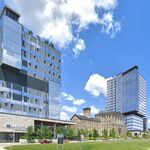wild goose chase
Active Member
I know prior to the 1960s many Black Canadians were American in origin but soon numbers from the Caribbean dominated the population of Black Canadians so that relatively few are say descended from third-generation immigrants today.
What happened to the historical African-American neighbourhoods in Toronto? Where were they and what later changes took place? Did many return to the US, spread throughout the Toronto area more broadly or to other Canadian cities, no longer becoming concentrated in any one area, and did African-Americans remaining in the city eventually assimilate to the Caribbean-Canadian and other later waves of more recent Black Canadian communities (this would be the opposite of what happens in the US, when it's later waves of Black immigrants that assimilate to the earlier Black communities).
What happened to the historical African-American neighbourhoods in Toronto? Where were they and what later changes took place? Did many return to the US, spread throughout the Toronto area more broadly or to other Canadian cities, no longer becoming concentrated in any one area, and did African-Americans remaining in the city eventually assimilate to the Caribbean-Canadian and other later waves of more recent Black Canadian communities (this would be the opposite of what happens in the US, when it's later waves of Black immigrants that assimilate to the earlier Black communities).
Last edited:




